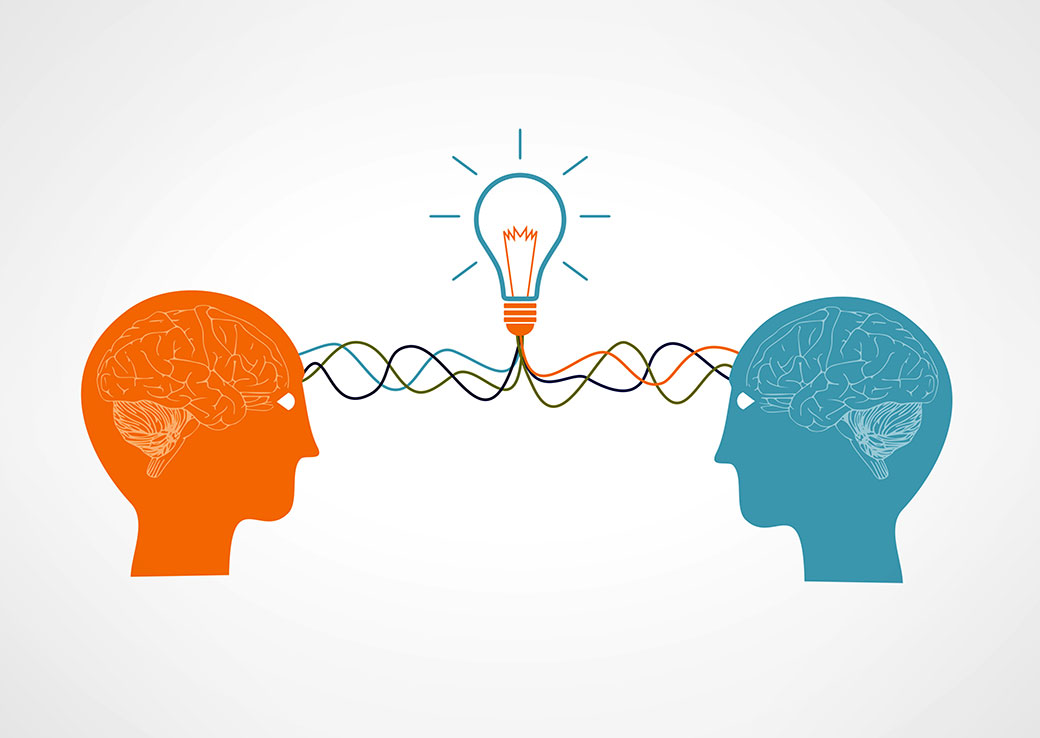5 Ways to Build and Develop Empathy Skills

Empathy is not just an emotion, but an important part of emotional intelligence, or EQ—a skillset that’s essential for navigating the world today. You need empathy to communicate effectively and create a peaceful environment in work and life. Part of the human experience is meeting new people and learning to live with others who are different from ourselves. Empathy can help bridge the gaps between us.
Most people only tend to think about developing professional skills. As a result, our world is full of adults who lack an ability to understand the perspectives of other people. They can’t communicate properly. They can’t let their guard down and foster the vulnerability that’s necessary for meaningful relationships.
The absence of empathy is most obvious during a conflict. Two people (or more) could be yelling at the top of their lungs because they don’t know how to listen. Sometimes they might even be saying the same thing.
The absence of empathy is also painfully apparent in adults who are unable to develop deep relationships. They may even have a lot of connections in their social network, but are afraid to open up to another person. Many times this fear of vulnerability accompanies an inability to empathize with another person and their vulnerability.
Why is Empathy so Important

Empathy is simply the ability to get out of yourself when relating to other people in any situation. It’s the ability to walk in another person’s shoes. That ability facilitates better communication, understanding, and the transfer of ideas and information between people.
Psychologists have explained empathy from three different perspectives:
A. Cognitive empathy is about understanding what a person might be thinking in their current situation. This understanding helps you express your empathy in words.
B. Emotional empathy is about feeling what another person feels, and it can help forge emotional connections with others.
C. Compassionate empathy or empathic concern is about going beyond thoughts and feelings with actions.
The importance of empathy cannot be overemphasized. Empathy is what helps us navigate life, helps us understand others, and respond properly to every situation or circumstance we find ourselves in. Some research has even shown that the more empathy one has, the kinder they become. In fact, we often (rightfully) associate empathy with kindness, warmth, gentleness, and care.
As much as empathy is a positive trait, it can sometimes be detrimental if it paralyzes a person in an emergency. For example, a highly empathetic person might be rendered powerless by the weight of emotions they would feel in witnessing or experiencing a car accident.
But even so, empathy is a crucial part of life because without it, many people would live in the bubble of their own perceptions. Every single human being on this earth experiences joy, sadness, hurt, and love, but to varying degrees. To lack empathy is to invalidate the emotions and experiences of others and to make assumptions about them based on a narrow minded personal point of view. That’s why conflict and miscommunications are so rampant. Empathy is now a skill that must be learned and properly applied. According to psychologists Eisenberg & Morris, “empathy is indeed considered to be the glue that makes social life possible.”

In truth, we are all naturally disposed to empathetic feelings. However, like every other skill, empathy must be exercised and developed. Here are 5 different ways you can learn how to develop empathy skills for others:
1. Develop Empathy Skills by Listening:
Listening is very different from hearing. Active listening requires you to not only listen with your physical ears, but also with your mind. It requires you to put aside your sentiments and personal prejudices in order to completely understand what the other person is saying or trying to communicate.
Sometimes, understanding others can be a bit tricky because we are blinded by our own emotions, so much so that we cannot see beyond what we are experiencing.
One way to develop empathy skills is by picturing what the person might be going through by asking yourself the million-dollar question: “how would I feel if this was done to me?”
Kindness and compassion are a result of imagining oneself on the other end of a given situation. Developing this kind of understanding takes time and effort. It’s not something that you have the moment you begin your empathy journey. While some people are naturally empathetic, it’s not common.
One of the easiest ways to assess your listening abilities is with self observation: when someone is sharing something, do you respond by focusing on them, or do you automatically start sharing a similar experience for the sake of showing you had it worse? When resolving a conflict, do you truly listen to the other person or do you listen just to develop a good response? Do you find yourself entirely blocking out what the other person is saying and responding antagonistically? Through this self observation, you can begin to see where you truly are in terms of empathic listening.
2. Develop Empathy Skills With Your Words:
Listening is great for developing empathy, but it is only one side of the coin, the other side being speaking. The words we speak are extremely important, and they can carry so much weight. Words convey heavy meanings; they can uplift a person or tear them down. One of the best ways to show kindness and empathy is by the appropriate use of the right words.
Sometimes the words we use convey emotions without us even being aware. Some expressions and phrases can have grave consequences when used wrongly on certain people or situations; one of the main characteristics of highly empathetic people is their choice of words.
Words leave a lasting impression on people and are not easily forgotten. Words like “I have a dream” were spoken ages ago, but when said anywhere, the impact of those words remains the same. That is how powerful the use of words can be.
In every kind of relationship—be it marriage, work, friendship, or family— the success of that relationship is highly dependent on communication. Showing another person that you can listen and understand them by correctly interpreting what they say validating their experience is a good way to build depth and understanding in the relationship.
Supportive statements like…
“I see you did as much as you could.”
“I understand how difficult this is for you.”
“You are doing remarkably well despite everything.”
…can go a long way in strengthening someone else who is going through difficult times. You might consider refraining from expressions like “I was in a similar situation last week” or “I have had it worse”. These kinds of expressions do not show empathy; they are competitive rather than supportive.
Hopefully you see the importance of words and how they affect relationships through difficult situations. Be intentional about the use of your words and what you say to others; take out time to properly consider your responses before expressing them loudly.
3. Be Honest, but Polite:
The phrase “communication is key” has been used so often that it is almost cliché. However great the statement is, it isn’t completely correct. Communication is key, but there are all kinds of communication: miscommunication, under-communication, and over-communication, none of which are healthy for any kind of relationship.
In a bid to be perceived as empathetic, some people tend to overcompensate in their actions or use of words. There are times where you might find yourself in a situation where you will be tempted to over-do your kindness and flatter, or maybe even lie for one reason or the other.
The value of honesty in a relationship is immeasurable. Honesty breeds trust, and a solid connection between two parties. Telling a person the truth in a conflict or a difficult situation might be hard, but it is very key for learning how to develop empathy skills.
Being truthful doesn’t always have to equate to being harsh, rude, or unkind. It is possible to be honest and kind: these two traits are not mutually exclusive. By the same token, sometimes it is good to keep your opinion to yourself, because sharing it will be anything but empathetic. Knowing when a moment like this is at hand requires some serious intuition, and you may not get it right every time. Try to think about what the end result of you sharing your opinion might be before you share it.

4. Open Up Your Mind To Empathy:
Being open-minded allows you to consider perspectives that differ from your own. Open-mindedness allows you to be honest and realistic, especially with yourself. It means that you widen the scope of your horizon enough to accommodate the realities of others.
Empathy is about understanding and communication, so a closed-minded person cannot be empathetic because they are too stuck in their ways. They are not willing to accept or even so much as consider what another person may believe to be true, regardless of the potential authenticity of their perspective.
Open-mindedness can also be expressed through vulnerability. Nobody wants to exist in an isolated reality; we all want to feel seen, heard, and understood by others. Vulnerability allows you to let your guard down enough to express your thoughts kindly and in a relatable manner. This helps build a trusting environment for the other person to feel safe and secure, thereby building the possibility for mutual empathy.
Empathy and open-mindedness go hand-in-hand; they work together to build deep and meaningful relationships that are good for both parties. One thing most people fear about vulnerability is the thought of sharing precious information they would rather not share with others. They are scared that sharing this information would put them in a weakened position. That doesn’t have to be the case. First off, vulnerability does not mean you have to violate your own sense of privacy and over-share. Secondly, people often find that when they do share their inner world, it actually strengthens their relationship and opens up greater possibilities for mutual empathy.

5. Acknowledge Any Privilege:
Privileges are an important part of our world; we are all the way we are because of certain things that we have gotten used to. Everybody has at least one privilege or another that greatly affects their opportunities, personality, and perspective in life.
These privileges could be a wealthy background, a liberating environment, a body free of disability, or a good education; it could be several other kinds of privileges that we have gotten so used to that we no longer recognize. A privileged person who doesn’t acknowledge these privileges might find empathy very hard to learn or express because they cannot comprehend the difficulties faced by another person.
In truth, we all have one privilege or the other. Learning how to develop empathy for adults might require self examination and recognition of what your privileges are: consider how these privileges might have affected your life and impacted your perspective; try to understand that other people have it differently from you. In acknowledging what you have that other people don’t, you take a big step toward empathy and create more space for communication.
In some cases, you can use privilege towards shaping a life with more empathy. For instance, if you had the privilege of growing up in an emotionally supportive home, that privilege can be one that facilitates treating others with kindness. Privilege can either be a good or a bad thing, depending on how you choose to use it.
Empathy in the Workplace
One of the most undeniable uses for empathy also can be found in businesses and leadership. In business, being empathetic will play a big role in motivating the team under your command, and even in boosting your sales through understanding your customer base. An experiment involving the creation of a new brand of potato chips for pregnant women was carried out where 200+ adults were divided into two groups; one of the groups was asked to create a product based on how they imagined how a pregnant woman would relate to and feel about potato chips, while the other group created a product based on objective considerations regardless of consumer feelings. Which group created a more impactful product? Hint: it’s the one that created pickles and ice cream flavored chips.
How Do You Empathize? Are there times you’ve felt misunderstood, misjudged or angry because someone wouldn’t just listen to you? Have you ever left a situation or conversation feeling like you could have handled it better, or wished you had said (or hadn’t said) something? How do you manage communication and empathy with your colleagues and loved ones?
Let us know in the comments below!
Check out these additional articles on how to develop empathy skills:
A study that shows that women are naturally more empatheticthan men.
Genetics is a factor in developing empathy.
Empathy is great for innovation in business.






Leave A Comment